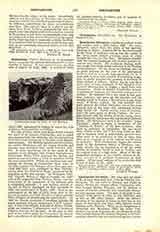

Constantine (CIRTA), Diocese of (CONSTANTINIANA), comprises the present arrondissement of Constantine in Algeria. It was separated from the Diocese of Algiers July 25, 1866. A pontifical Brief, dated 1867, authorized its bishop to adopt the title of Bishop of Constantine and Hippo.
The city of Cirta, which took in the fourth century the name of its restorer, Constantine, and in which this emperor built two churches, was an episcopal see from the second century up to the time of the Mussulman invasion. The Bishops Agapius and Secundinus, the soldier Aemilianus, and the virgins Tertulla and Antonia were martyred there under Valerian (253-60). A Latin inscription cut in the rocks at the entrance to the Rummel Pass (Corpus Inscriptionum Latinarum: Africa, 7924) mentions Sts. Marian and James as martyrs either at Cirta or Lambesa during the same persecution. Within the territory now comprising the Diocese of Constantine there were, in the fifth century, 195 dioceses, whose titles and episcopal lists have been published by Msgr. Toulotte, among them the Diocese of Hippo, governed by St. Augustine in the fifth century. On August 30, 1842, Msgr. Dupuch, Bishop of Algiers, brought the right arm of St. Augustine from Pavia to Hippo, and the anniversary of the translation of this precious relic is celebrated annually. A new basilica erected on the hill of Hippo, purchased by Msgr. Lavigerie in 1880, was consecrated March 11, 1900. Prior to the enforcement of the law of 1901, there were in the diocese Lazarists, the Little Brothers of Mary, and the White Fathers; at present only the latter remain. In 1900 the diocese contained 2 foundling asylums, 22 infant asylums, 2 boys’ orphanages, 4 girls’ orphan-ages, 3 industrial schools, 2 houses of shelter, 13 hospitals and hospices, 7 dispensaries, and 15 houses of religious who care for the sick. At the close of 1905 (end of the period under the Concordat) the diocese had a population of 137,041; 5 pastorates, 67 succursal parishes (mission churches), and 17 curacies remunerated by the State.
GEORGES GOYAU

